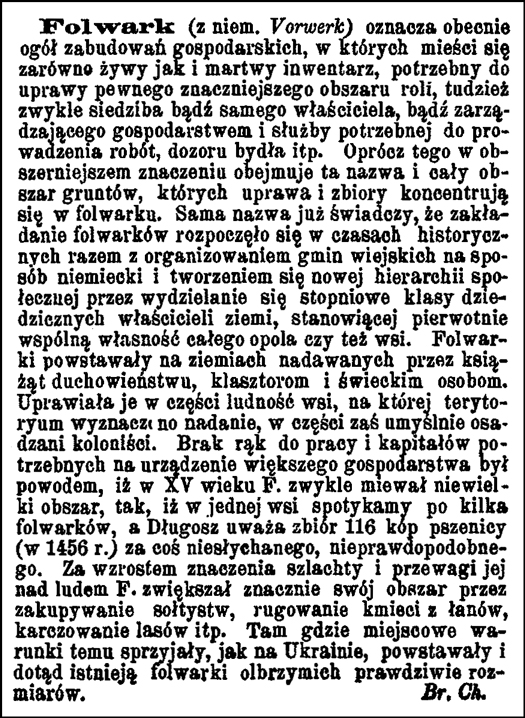While reading the Słownik Geograficzny Królestwa Polskiego i Innych Krajów Słowiańskich (Geographical Dictionary of the Kingdom of Poland and other Slavonic Countries), researchers will frequently encounter unfamiliar terms. Many of these words are archaic, and even native speakers of Polish may have trouble with these.
Some terms are simply untranslatable, and other terms are translated into equally obscure English words. One case in point is the Polish word Folwark, which is commonly translated as grange . The term grange may be described further as “large, manorial farmstead”. While those descriptions may help, many genealogists, me included, may still be left in the dark about what a folwark really is.
The Słownik Geograficzny provides additional help with some of these unfamiliar terms. Even those familiar with the Słownik may not be aware this assistance is there, because the definitions are nestled among the descriptions of the places, in alphabetical order with all the other Słownik entries.
The definition of folwark is located in Volume I on page 396:
Słownik Geograficzny Definition of Folwark
Source: Sulimierski, Filip, Chlebowski, Bronisław, and Władysław Walewski, eds., Słownik Geograficzny Królestwa Polskiego i Innych Krajów Słowiańskich (Geographical Dictionary of the Kingdom of Poland and other Slavonic Countries) – Warsaw 1880, Volume I, page 396.
Click on the link for a PDF copy of the Słownik Geograficzny Definition of Folwark. Translated from the Polish, the entry reads:
Folwark, [Grange] (from the German Vorwerk) these days denotes the total farming development in which is situated livestock and farm equipment alike, necessary for farming of a certain more substantial cultivated field, generally including here the residence of either just the owner or the manager of the farm and the necessary servants for the conduct of work, the supervision of the dairy cows, etc. Aside from this more detailed meaning, it encompasses the name and the whole area of land which cultivation and harvest concentrate on in the folwark. The same name yet shows that the establishment of granges began with historical times together with the establishment of rural gminas [municipalities] in the German manner and a new social hierarchy was formed by gradually producing a hereditary landowner class, originally making community property of the whole union of settlements with also the village. Folwarks came into being on the land granted by the prince to the clergy, the religious orders, and the lay people. The population of the village cultivated it in part, on that territory designated as a grant, in part, on the other hand, deliberately for settling a colony. The lack of work hands and capital necessary for equipment of a larger farm was the reason that, in the 15th century, the folwark usually had an area that was not very large; indeed, in a single village one encounters several folwarks, but Długosz oversaw a harvest of 116 loads of wheat (in the year 1456) which was unprecedented and incredible. With the increase in the importance of the nobility and their advantage over the commoners, folwarks significantly increased in area by the purchases of the sołtys’ [elected chairmen of the village councils], displacing the peasants from the fields, clearing the forests, etc. In those places where the local circumstances of the time were favorable, such as in Ukraine, folwarks of truly enormous sizes sprung up and have existed up to the present.
                                                 Br[onisław] Ch[lebowski]
The Słownik Geograficzny includes many other definitions, all scattered throughout the many volumes of this gazetteer in alphabetical order with the descriptions of the villages. These definitions hellp make the Słownik an even more valuable resource for genealogists researching their Polish ancestry.
Copyright © 2007 by Stephen J. Danko





What can you tell me about folwark Dabie near Brzesc Kujawski?